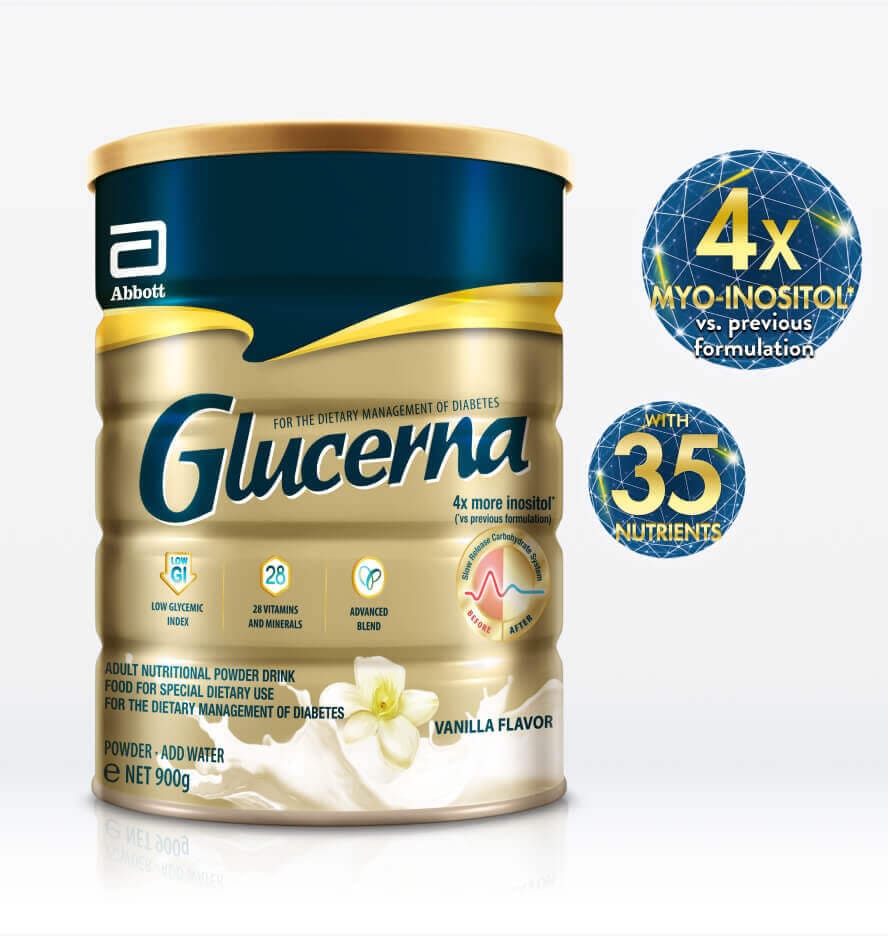Glucerna Vanilla Flavor
- Title
- Glucerna® Vanilla Flavor
- Detail Page Path
Moving into the new normal, we have all become more aware of immunity and our health. Immune system support is even more critical for people with diabetes as viral infections can increase inflammation and contribute to more severe complications. While many with diabetes already consider good nutrition a part of overall well-being and blood sugar control, you may be surprised how diet and muscle health can impact the immune system1.
Muscles are well-known for their role in movement, and muscle preservation is vital for maintaining strength and function as we age2 . There is evidence suggesting muscles play a role in immune function. Muscles produce and release compounds that play an important role in creating, activating, and distributing some immune cells3. Muscles are also key sources for amino acids used by the body during trauma or infection4.
Low muscle mass and inadequate protein intake may weaken the body’s response to an injury or infection, and emerging research suggests loss of muscle mass is associated with compromised immunity and infections5. While everyone needs to prioritize their muscle health and prevent muscle loss as they age, those living with diabetes need to be even more vigilant: diabetes accelerates muscle loss, reduces muscle quality, and diminishes strength6.
Healthy muscles help maintain body weight and insulin sensitivity, which is vital for maintaining blood sugar levels and keeping diabetes under control. There are steps that people with diabetes can take to maintain muscle and immune health, including staying physically active and eating a balanced diet.
Exercising regularly – aiming for at least 150 minutes of moderate-intensity exercise a week – and eating a well-rounded diet are essential to staying healthy, supporting muscles, and helping those with diabetes manage their blood sugar. Important steps to support your muscle and immune health through nutrition include:
It’s not always easy to get enough of all the nutrients needed to adequately support muscle and immune health, especially for people with diabetes who also need to stay on top of their medications and routines and feel they don’t have enough time to plan ahead when it comes to meals and snacks. However, studies have shown that diabetes-specific nutritional supplements – as part of a healthy lifestyle program – can help close that gap and provide the proper nutrients, resulting in improved health outcomes in people with diabetes. These include better glycemic control, improved blood pressure, reduced or maintained body weight, and, in critically ill patients with diabetes, lower mortality 8, 9,10,11.
1. How to Support Your Immune System Through Nutrition (nutritionnews.Abbott)
2. Wang DXM, et al. J Cachexia Sarcopenia Muscle.2020;11:3-25.
3. Nelke C, et al. EBioMedicine. 2019;49:381-8.
4. Rooyackers OE and Nair KS. Annu Rev Nutr.1997;17:457-85.
5. Argiles JM, et al. J Am Med Dir Assoc. 2016;17:789-96.
6. Won Park S, et al. Diabetes Care 2007 Jun; 30(6): 1507-1512.
7. Kerksick CM, et al. J Int Soc Sports Nutr.2017;14:33.
8. Devitt A., et al. Journal of Diabetes Research and Clinical Metabolism. 2012; 1(1):20.
9. Chee WSS, et al. BMJ Open Diabetes Research & Care. 2017; 5(1):e000384.
10. Han Y-Y, et al. Clin Nutr. 2017; 36(6): 1567-1572.
11. Mustad VA, et al. BMJ Open Diabetes Res Care.2020;8:e001258.
When your dietician recommends that you may need to lose weight, eating healthy may help keep your diabetes under control.
Every choice matters. Learn how your food choice within each meal can help you make a big difference in managing diabetes.
For people with diabetes, it’s important to know that of all the things that you eat, carbs impact your blood sugar levels the most.
Glucerna® is the number 1 selling diabetes nutritional supplement in the world*. It contains 35 nutrients, slow-release carbohydrates and 4x more inositol vs previous formulation, that delivers a dual action for tight blood sugar control.
* Euromonitor International Limited; total global retail sales in 2023 for diabetic diet enhancer drinks that are not marketed as a meal replacement product. Euromonitor and Abbott calculation based in part on custom research conducted between October and November 2023 and Euromonitor Passport Consumer Health 2023 based on 2022 data.

PH.2025.67670.GLU.1
You are about to exit for another Abbott country or region specific website.
Please be aware that the website you have requested is intended for the residents of a particular country or region, as noted on that site. As a result, the site may contain information on pharmaceuticals, medical devices and other products or uses of those products that are not approved in other countries or regions.
The website you have requested also may not be optimized for your specific screen size.
Do you wish to continue and exit this website?